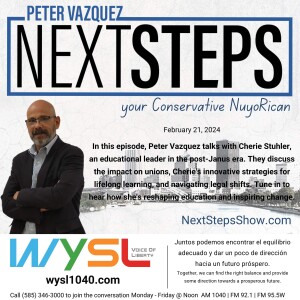
In this episode, we delve deep into the ever-evolving landscape of education, with a special focus on what’s really happening inside our classrooms. Your host, Peter Vazquez, sets the stage for an insightful discussion on the challenges and triumphs of the educational sector.
Education is not just a path to academic enlightenment but a journey of lifelong learning, nurtured through critical thinking and open-mindedness. Amidst this journey, educators play a pivotal role, acting not just as teachers, but as guides, mentors, and visionaries who shape the future one student at a time. We have the privilege of welcoming a paragon of educational leadership, Cherie Stuhler. Known for her fearless and dynamic approach, she embodies the belief that education should be a relentless pursuit of knowledge, embraced with discerning eyes and ears.
Our conversation is particularly timely, as we navigate the "post-Janus realities" confronting the educational sector. The landmark U.S. Supreme Court decision in Janus v. American Federation of State, County, and Municipal Employees, Council 31, decided on June 27, 2018, has significantly altered the financial and operational landscape for public sector unions. By ruling that public sector employees cannot be required to pay agency fees to unions they are not members of, as it violates the First Amendment, the decision has sparked a sea change in union dynamics and collective bargaining.
This decision has wide-ranging implications, from decreased revenue for public sector unions to altered strategies for member engagement and retention. For educators and the unions that represent them, this means navigating a new terrain of legal and financial challenges while continuing to advocate for their rights and working conditions. The ruling emphasizes the importance of solidarity, innovative membership recruitment, and the need for unions to demonstrate unequivocal value to their constituents.
We will explore the role of the Taylor Law, a critical piece of legislation governing labor relations between public employers and employees in New York State. This law, with its provisions on the right to organize, prohibition of strikes, and the establishment of the Public Employment Relations Board (PERB), sets a unique stage for public employment relations, balancing the need for uninterrupted public services with the rights of employees to collective bargaining.
In this discussion, we aim to shed light on these complex issues, examining the impacts on educators, students, and the broader community. How have these legal shifts affected the morale and motivation of our educators? What strategies are being employed to navigate these changes effectively? And most importantly, how do we ensure that the pursuit of education remains an enriching and fulfilling journey for both teachers and students alike? Join us as we engage in this critical conversation.
#NextStepsShow #PuttingPeopleFirst #ConservativeNuyoRican #CommunityTalk
No comments yet. Be the first to say something!